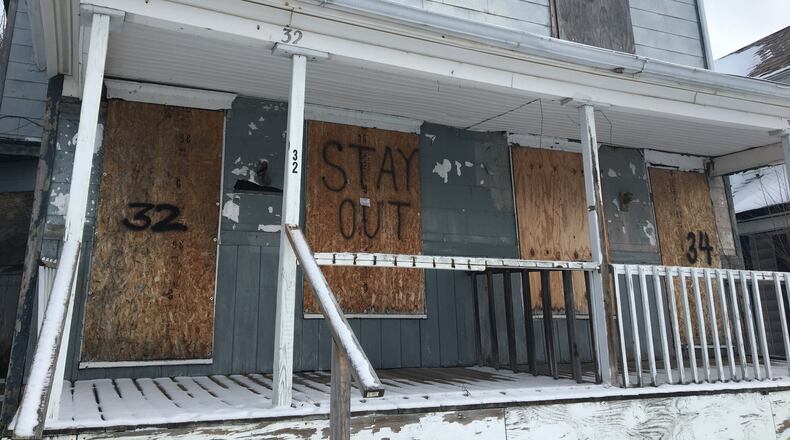Cleaning up the city’s blight is one of the top concerns residents voiced during public sessions seeking feedback on how the city will spend $138 million in federal rescue funds it has been awarded.
Now that the listening sessions are over, the city of Dayton is entering a new phase of determining how to spend the federal rescue funds. Survey results are being tabulated, and the city recently hired a consultant to oversee administration, accounting and compliance services for the largest grant in Dayton’s history.
Dayton is still waiting for final guidance from the U.S. Treasury about how it can use the funds, but city officials say they have lobbied in favor of making some activities eligible, like demolition, a top priority.
Many questions remain about what kinds of investments Dayton will make, but residents say they hope this money will be game-changing for the community.
“I really think this money needs to go into the poorest neighborhoods and lift them up,” said Mary Sue Gmeiner, a resident of Walnut Hills who also serves on the board of Neighborhoods Over Politics.
Earlier this week, Dayton held the last of about seven public meetings meant to collect feedback about how community members want the city to spend its $138 million award from the American Rescue Plan Act that Congress approved.
Community members who attended the listening sessions this month were directed to fill out surveys that asked about their spending and investment priorities. More than 1,500 people also filled out an online version of the survey.
Gmeiner attended four of the public meetings because she wanted to hear what people in different areas and neighborhoods had to say on the subject. She said between 40 to 100 people came to those sessions.
Blight was one of people’s top concerns, she said, and many attendees are strongly in favor of using the money to knock down vacant and abandoned properties.
City officials have said demolition is not one of the eligible expenses under the Treasury’s initial guidelines, but they requested it be added to the list of qualifying activities.
One question on the city’s survey asks respondents how much they prioritize using the federal rescue funds to demolish vacant, abandoned and hazardous properties.
The city’s annual survey of residents consistently has found that an overwhelming majority of respondents want the city to increase blight-removal activities.
Some community members who attended the public meetings said they want new or upgraded parks and recreational amenities.
Others called for new community centers or investments in commercial corridors and business districts to lure retail and food and drink establishments to underserved areas.
Gmeiner said she fears that some neighborhoods that are in the most dire need of new investment could be overlooked.
She said she worries that well-organized neighborhood, community and other types of groups will have a significant advantage when it comes to seeking and receiving some of Dayton’s funding because they know what to ask for and the best way to request it.
Some neighborhoods and community members do not have a strong and unified voice to communicate what their residents want and need, she said.
“What’s the application look like, and how do people find out about the application and what they are able to get money for?” she asked. “How much assistance will there be for getting the money to the neighborhoods and organizations that need it the most?”
Small organizations are going to need help requesting funds and putting them to good use in ways that comply with the federal rules, Gmeiner said.
Gmeiner also said she is glad that promoting racial equity, inclusion and justice is one of the city’s guiding principles for use of this money.
This is an unparalleled opportunity to address systemic racism in the community, she said, and the right investments could make a huge difference.
The city has received the first half of its allocation from the American Rescue Plan Act and the remaining funding will be issued next year.
The city has until the end of 2024 to spend its funds.
The city this week also approved spending more than $2 million to hire consultant Guidehouse to help oversee grant administration, accounting and compliance with the rescue act’s rules and regulations.
Guidehouse helped navigate federal requirements and restrictions related to the city’s receipt of millions of dollars in COVID-19 relief funds under the CARES Act, said Joe Parlette, Dayton’s deputy city manager.
The city wants Guidehouse onboard and ready to go when the U.S. Treasury issues its final spending guidelines for the rescue funds, which could happen next month, he said.
The new service agreement with Guidehouse has an initial term of three years at a cost of about $1.2 million but it allows for a pair of one-year renewal options, Parlette said.
The city also expects to approve another forthcoming contract for auditing and compliance services to further ensure the city follows federal financial regulations and reporting requirements, he said.
The city says it is tabulating the results of the community surveys and will share those findings when complete.
About the Author




